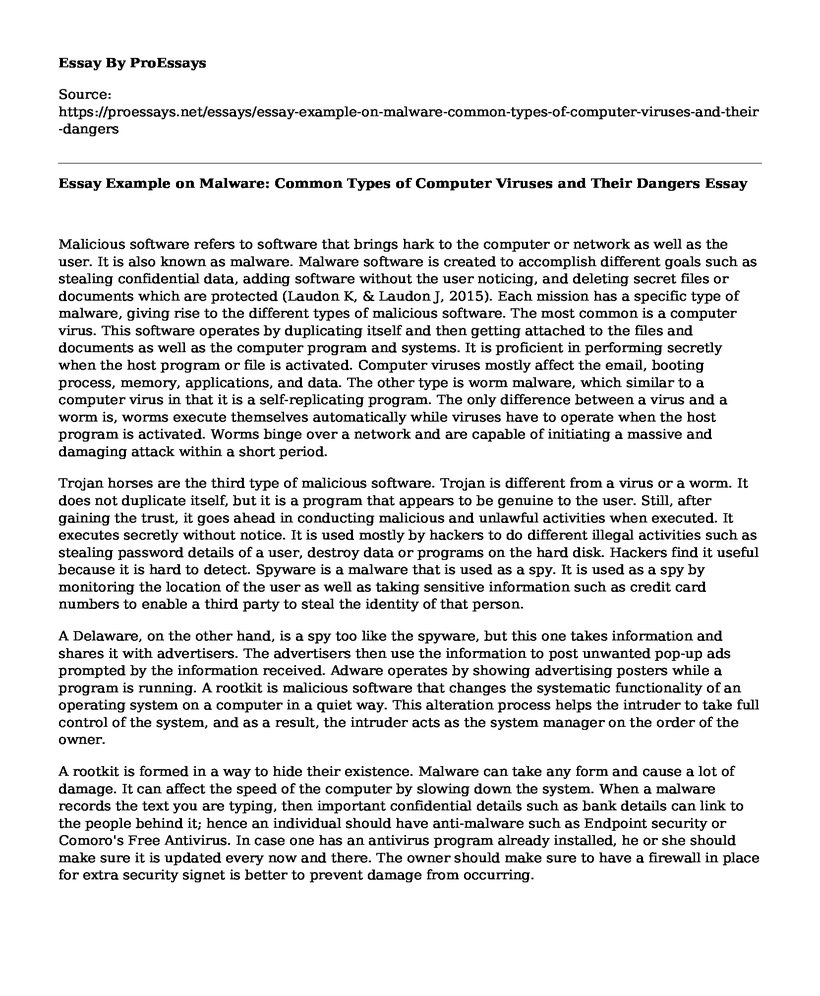Malicious software refers to software that brings hark to the computer or network as well as the user. It is also known as malware. Malware software is created to accomplish different goals such as stealing confidential data, adding software without the user noticing, and deleting secret files or documents which are protected (Laudon K, & Laudon J, 2015). Each mission has a specific type of malware, giving rise to the different types of malicious software. The most common is a computer virus. This software operates by duplicating itself and then getting attached to the files and documents as well as the computer program and systems. It is proficient in performing secretly when the host program or file is activated. Computer viruses mostly affect the email, booting process, memory, applications, and data. The other type is worm malware, which similar to a computer virus in that it is a self-replicating program. The only difference between a virus and a worm is, worms execute themselves automatically while viruses have to operate when the host program is activated. Worms binge over a network and are capable of initiating a massive and damaging attack within a short period.
Trojan horses are the third type of malicious software. Trojan is different from a virus or a worm. It does not duplicate itself, but it is a program that appears to be genuine to the user. Still, after gaining the trust, it goes ahead in conducting malicious and unlawful activities when executed. It executes secretly without notice. It is used mostly by hackers to do different illegal activities such as stealing password details of a user, destroy data or programs on the hard disk. Hackers find it useful because it is hard to detect. Spyware is a malware that is used as a spy. It is used as a spy by monitoring the location of the user as well as taking sensitive information such as credit card numbers to enable a third party to steal the identity of that person.
A Delaware, on the other hand, is a spy too like the spyware, but this one takes information and shares it with advertisers. The advertisers then use the information to post unwanted pop-up ads prompted by the information received. Adware operates by showing advertising posters while a program is running. A rootkit is malicious software that changes the systematic functionality of an operating system on a computer in a quiet way. This alteration process helps the intruder to take full control of the system, and as a result, the intruder acts as the system manager on the order of the owner.
A rootkit is formed in a way to hide their existence. Malware can take any form and cause a lot of damage. It can affect the speed of the computer by slowing down the system. When a malware records the text you are typing, then important confidential details such as bank details can link to the people behind it; hence an individual should have anti-malware such as Endpoint security or Comoro's Free Antivirus. In case one has an antivirus program already installed, he or she should make sure it is updated every now and there. The owner should make sure to have a firewall in place for extra security signet is better to prevent damage from occurring.
Conclusion
In conclusion, users of computers should be aware of the different types of malware to be able to install the correct anti-malware. This is because the consequences of not having one in place can be severe. The durability of the devices would also be enhanced, so would be the efficiency.
References
Laudon, K. C., & Laudon, J. P. (2015). Management information systems (p. 143). Upper Saddle River: Pearson.
Cite this page
Essay Example on Malware: Common Types of Computer Viruses and Their Dangers. (2023, Apr 24). Retrieved from https://proessays.net/essays/essay-example-on-malware-common-types-of-computer-viruses-and-their-dangers
If you are the original author of this essay and no longer wish to have it published on the ProEssays website, please click below to request its removal:
- Open Source Content Management Systems
- Search Engine Optimization and Database Management System
- Engineer's Professional and Technical Competencies Paper Example
- Essay Sample on Strategic Leadership and Big Data Phenomenon
- The Impact of IT: Cyber-Attack & Its Consequences - Research Paper
- Cyberstalking: Fraud, False Allegations & Threats - Essay Sample
- Secure Healthcare Data: Protecting Sensitive Info From Breaches & Leaks - Essay Sample







